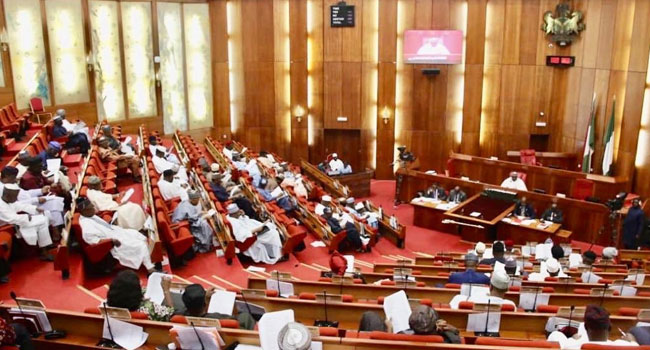Electoral Bill: Senate Approves Direct, Indirect Or Consensus For Party Primaries

The Electoral Act (Amendment) Bill, 2021, enacted by the National Assembly on November 18, 2021, was re-amended by the Senate on Wednesday.
Ezrel Tabiowo, Special Assistant to the Senate President, revealed this in a statement on Wednesday.
According to him, the chamber endorsed direct, indirect, or consensus primaries or consensus as procedures for the nomination of candidates by political parties for various elected seats in Clause 84(2) of the report.
The Senate also approved in Clause 84(3) that “a political party that adopts the direct primaries procedure shall ensure that all aspirants are given equal opportunity of being voted for by members of the party.”
Clause 84(4) further provides that “a political party that adopts the system of indirect primaries for the choice of its candidate shall adopt the procedure outlined below; (a) In the case of nominations to the position of Presidential candidate, a political party shall, (i) hold special conventions in each of the 36 states of the federation and FCT, where delegates shall vote for each of the aspirants at designated centres in each State Capital on specified dates.”
The article stipulates that a National Convention be held to ratify the candidate who receives the greatest number of votes.
The amendment was introduced in response to a move by Senate Leader Yahaya Abdullahi (Kebbi North) to recommit the bill to the Committee of the Whole.
The Senator noted that on Thursday, November 18, 2021, President Muhammadu Buhari (retd.) indicated that he would withhold his assent to the Electoral Act No. 6 2010 (Repeal and Re-enactment) Bill, 2021, which the National Assembly had enacted and delivered to him.
Senator Abdullahi pointed out that the rationale for withholding assent drew a line between the President’s remark in Clause 84 and the rationale for withholding assent.
In a letter to Senate President Ahmad Lawan, Buhari stated that bringing the bill into law would have major legal, financial, economic, and security ramifications for Nigeria, especially given the country’s unique characteristics.
He went on to say that it would have a negative influence on citizens’ constitutionally guaranteed rights to engage in government.
After consulting with key government ministries, departments, and agencies and conducting a comprehensive assessment of the Bill, he made the decision.
Senator Abdullahi, on the other hand, explained that the motion to recommit the bill to the Committee of the Whole was prompted by the “need to address the observation by Mr President C-in-C and make necessary amendments in accordance with Order 87(c) of the Senate Standing Orders, 2022 (as amended); and relying on Order 1(b) and 52(6) of the Senate Standing Orders, 2022 (as amended).”
As a result, the chamber reversed its decision on the impacted Clause of the Bill, recommitting it to the Committee of the Whole for further deliberation and passage.




